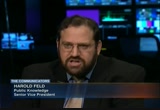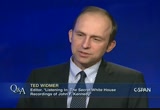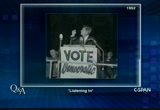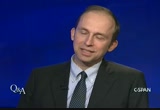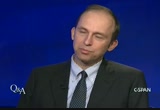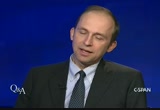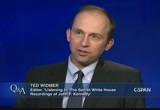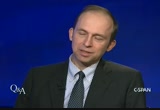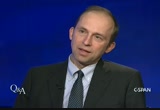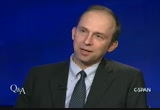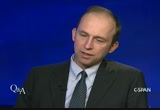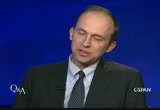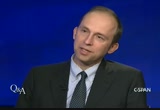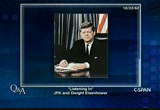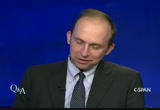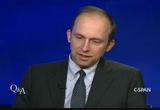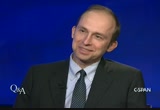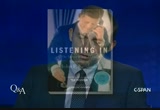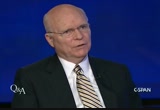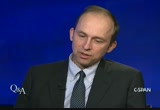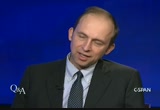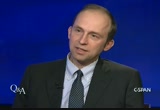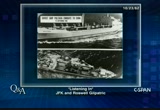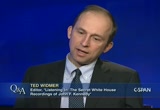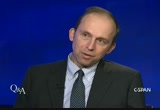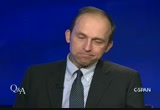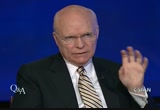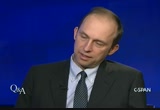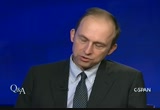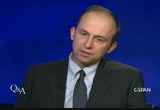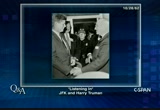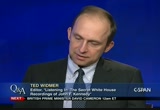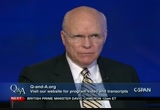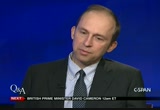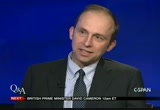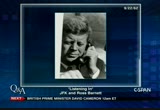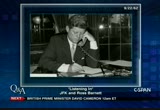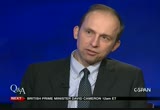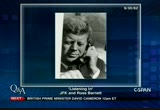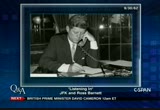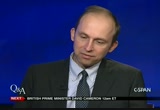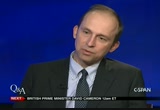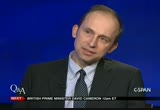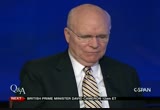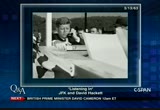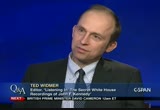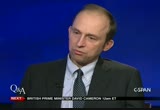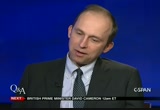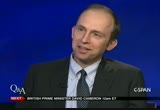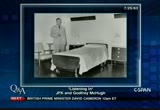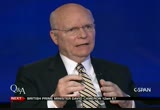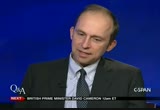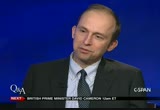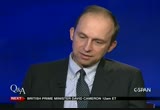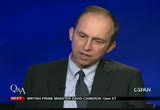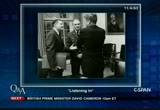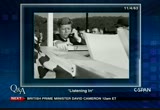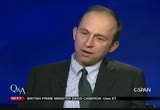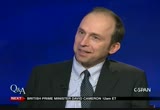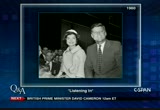tv Q A CSPAN November 25, 2012 11:00pm-12:00am EST
11:00 pm
we have to find out who did well, who didn't do well and how we make sure everybody's doing well. >> impact of super storm sandy on telecommunication systems tomorrow night at 8:00 eastern on "the communicators" on c-span2. this week on "q&a," "listening in: the secret white house recordings of john f. kennedy.," forwarded by caroline kennedy. >> ted widmer, how did you get involved in doing a book on the john f. kennedy tapes? >> well, there was a lot of excitement leading up to the 50th anniversary of the kennedy administration, which is three years of the 50th anniversary. elms around the cuban missile crisis, october, 1962.
11:01 pm
all of us wanted to have a good book ready for the fall of 2012. and many of us in the historical community as well as certainly at the library knew that there were these tremendously rich tapes, only a small percentage of which had actually been heard, and that it would be a service to the historical community and to all americans to get the tapes out to the listening public. so the library made the tapes available, but they need add historian to write an introduction and annotate, and so that's where i came in. >> i'm going to run a quick one here. this is from the 1952 senate race. it's not a tape of john f. kennedy, but it's a jingle. let's listen to this. when we vote this november let's all remember let's vote for kennedy make him your selection in the senate election he'll do more for you
11:02 pm
and me look at kennedy's history you'll see it's no mystery he's your kind of man so do all that you can and vote for kennedy ♪ >> we added the pictures and photographs ourselves. but that's a part of the c.d.'s that you get with the book. >> it is. >> how come that's in that? >> well, it's audio and it's great. it's evocative of a time really before tv. kennedy came out of politics before television was as important as it became, and then he rode the importance of tv very effectively. but that's from an earlier time, 1952. tv existed, but not many americans had it. music was really important to politics, both on radio and then even at events, where people would sing.
11:03 pm
and so like any politician, he need add theme song, and in 1952 he was running for senate for the first time and had a very well-organized campaign and had to have a song. i guess the short answer to your question is i listen to a lot of audio. the tapes themselves coming out of the white house. but then there were a lot of audiotapes of kennedy speaking into a dictaphone, dictating messages to his secretary, dictating chapters of profiles of courage, and even a very early radio interview from 1940, when he was a very young man, just out of hartford, just published his first book. so i loved the whole range of that audio, and we clue that early radio interview as well. >> so when did you start this project? >> only about a year ago. it was a rapidly evolving historical task. i listened to a lot of these tapes at night and on weekend. i got very immersed in the world of listening. there were good days and bad days.
11:04 pm
when i started, a lot of it was inaudible to me. the quality of the meeting tapes is not always that good, especially in the cabinet room, a pretty big room where these primitive mics didn't pick up the sounds that well. often the distance of the room, it might not sound very loud at all, someone close would sound very loud so. there were days i thought i can't get this done, it's too hard. but over time i began to hater better. -- hear it better. and then the telephone tapes were a big step forward. when i found those, i was very excited, because they're high quality in every way. >> you talked about a dictabelt conversation he had with himself or with his secretary. >> yes. >> this is from 1960, i assume -- well, i shouldn't assume anything, it was during the campaign? >> it was during a long dinner party conversation talking about running for president. probably a few days later he
11:05 pm
distilled his thoughts into a more organized, dictated memorandum for his secretary, and that must be the one you're about to play. >> it's on for 38 seconds. we'll listen. >> first speech i ever gave was on england, ireland and germany, victory neutral and vanquished. it took me three weeks to right and it was given at the american legion post. period. the speech went reasonably rather well, period. somebody came up -- the politician came up to me afterwards and said that i should go into politics, comma, that i might be in politician in a few years, period. >> he's giving us the punctuation. so why is that? >> he's telling her how to arrange the sentences, because he wanted his secretary to type it. it did appear in "politics u.s.a."
11:06 pm
the journalist, james cannon, edited that book. momentfascinating because he's thinking autobiographically. he's still a young man, he's running for president, but he's had a pretty rich life already. and his life included certainly his world war ii service, and he's talking there about coming out of the war. interestingly talks about being out of sorts. didn't really know what to do as a veteran coming back and then began getting interested in politics. but he had seen a lot of the world. he lived in england. at the time england was veering very rapidly towards a world war with germany. he had been at the u.n. conference in san francisco.
11:07 pm
seen a lot of the world and is beginning to put down his thoughts. i think the whole reason he installed the taping system was as a historian's helper, that he was beginning to think about the memoirs he would someday right. it was only his second year of the presidency and he probably thought he had until 1969 before he really had to sit down and write his memoirs. but i'm sure as a journalist and a historian himself, he was trying to gather the tools necessary for that book. aren the book, two c.d.'s attached for about 2 1/2 hours of conversations. what's the total number of hours that there are for all the conversations you had to listen to? >> the available tapes constitute 248 hours of tapes of meetings, meaning in the oval office or the cabinet room, and about 17 hours of telephone conversation. and the two have often been separated from each other. but we unite them together in this collection. >> who collected them? >> well, the whole story of the system and where it -- how it
11:08 pm
was operated, and then what happened to the tapes afterwards is a little bit murky. we know something about it. it began in the summer of 1962, not at the beginning of his presidency, but well into it. he asked a secret service agent, robert bouck, whose job ironically was to protect him from electronic surveillance, to install listening devices for his private use. and we know that, because bouck later gave an oral history to the kennedys library, and that's on record and anyone can consult it. and he described the installation of the mics, where they were in the two rooms, how the machine operator went down to the basement in an office, and they were kept in a closet by his secretary. they ran from that moment in july, 1962, until the end. and then immediately after the assassination they were disassembled and take place were given to evelyn lincoln, his secretary.
11:09 pm
and she held on to them for a while. and then probably robert kennedy had them, because when he wrote his history of the cuban missile crisis, "13 days," he almost certainly used them. there are moments where he gives dialogue from meetings, and he must have had access to the tapes to render the dialogue as faithfully as he did. after his assassination it's likely that senator ted kennedy had them, and eventually they got into a federal warehouse outside boston and finally were re-united with all the paper records of the kent library and given by the family to the library in the 1970's. it's taken a long time for their contents to be revealed, and that's mainly because the work is extremely painstaking. it's hard to hear, it's hard to
11:10 pm
write out transcripts. and i make a point of saying i'm guessing at some of these words. the official document is the tape recording, not the written version. we're just guessing. all of us -- sometimes two people are speaking at the same time and you just do your best. but also, it was necessary that our national archives professionals listened to make sure classified information was not being unnecessarily released. so there's a classification process and then a declassification process, and it just takes a long time. but now all known tapes are in the j.f.k. library and all of them have been released into the public records. so it's a good story. >> how much of it will we never hear?
11:11 pm
>> we don't know. we don't know what didn't make it to the kennedy library. but everything that is in the kennedy library has been released with the very small exception of the excised sections of the tapes, which are excised for national security reasons. maybe someday we'll hear what's in those moments of silence within the take place. but all known tapes have now been released. >> we've got a conversation between j.f.k. and former president eisenhower a little bit, about a minute of it, and it's about the cuban missile crisis. how many different topic areas do you have in the book besides the cuban missile crisis? >> about eight. there's history, politics, civil rights, cuba, vietnam, the world as it is, which is a summary of all of the world's problems, and the burden and the glory -- sounds like a little bit less than eight. but the burden and the glory is about the difficulty of being
11:12 pm
president and what it's like on a daily basis to occupy this terribly difficult job. >> on october 22, 1962, where are we in the cuban missile crisis when we hear this conversation? >> we're right smack in the middle of it. that's the day he gave his speech to the nation informing americans about the crisis. he had had the luxury of almost a week of near total blackout of the news to deliberate with his top advisors. but on monday, october 22, he gave a speech to the nation. 100 million americans listened to that speech and it was one of the most listened-to speeches in the history of the presidency. that's the day of this call to eisenhower. >> here's j.f.k. talking to mr. eisenhower. >> general, what about if the soviet union, khrushchev, announces tomorrow, that if we attack cuba it's going to be nuclear war? what's your judgment as to the
11:13 pm
chances they'll fire these things off if we invade cuba? >> oh, i don't believe that they will. >> you don't think they will? >> no. >> in other words, you would take that risk. >> as a matter of fact, though, what can you do? if this thing is such a serious thing, that we're going to be uneasy and we know what is happening now, all right? we've got to use something. something may make these people shoot them off. i just don't believe this will. >> yeah, right. >> in any event, i will say this. i'd want to keep my own people very alert. >> yeah. well, we'll hang on tight. thanks a lot. >> anything about the relationship between the two of them surprise you? >> it's a fascinating moment. it's amazing that eisenhower tells him to have his people alert.
11:14 pm
because everyone is completely on edge, so of course they're alert. and kennedy laughs. then he kind of jocularly says "hang on tight," which is a nice moment that even on this terribly tense day they're able to joke a little bit with each other. i think their relationship had come a long way. they were not close. eisenhower was from a different generation, and they were both conscious, i'm sure, of their military rank. eisenhower had been the treatment commander of european forces and kennedy was a lieutenant in the pacific, and they just -- they always would hold on to their sense of their rank in world war ii. but in their early meetings after the election of 1960, i think they had each come away quite impressed by the other, that kennedy had been describing eisenhower as kind of slow and doddering and not alert to the new realities of the 1960's. he met an extremely forceful and intelligent president of the united states in dwight eisenhower. i think likewise eisenhower was dismissive of a wealthy politician, a much younger man, a senator whom he had not
11:15 pm
condescended to meet as president. and he also came away as someone who was extremely well versed. so they began to like each other more. and especially during this crisis i think they had a sense of how lonely it is to occupy that office and how you're getting all kinds of advice, you're getting good advice, you're getting a lot of faulty advice, which kennedy was, including from his joint chiefs. eisenhower knew all about faulty military advice, and he was able to speak with his supreme authority about the dangers as well as the advantages of military advice. so he was a very useful ally to president kennedy. >> were you alive during the cuban missile crisis?
11:16 pm
>> i was in utero, to be precise. i was nearly born. >> when did you first begin to get interested in history and this story? >> in the late 1960's. i grew up in new england and every public library in its children's section had a book called "meet john f. kennedy." the cult that john f. kennedy was alive and well throughout my childhood and i became interested as a student of my region, which i always cared about my -- where i grew up, but also, the story was just so compelling. i was fascinated as a kid and stayed interested throughout. i now remember the 40th anniversary of the cuban missile crisis quite well. i know we're 10 years past that. i think it's a great story for americans to re-learn and i hope younger americans. i mean, one thing this book tries to do is to get past what has been for a long time our sense of the great tragedy of john f. kennedy, which is, of course, the fact that he was cut down before the end of his presidency was supposed to happen, and i think this book
11:17 pm
restores a sense of how much was accomplished and how rich his presidency was and how he, like any other president, had good days and bad days and had a lot to feel proud of in the fall of 1963. >> so when your mother was carrying you, what did she do for a living? >> she was a housewife, i believe. she eventually became a scholar of china. >> and where did she teach? >> she still teaches at wellesley college outside boston. >> and how about dad? >> dad was a grad student in chinese history at harvard and became a professor of chinese history, and then an administrator at brown university, where i work now. >> is it possible for anybody to be more harvard than you are? \[laughter] >> well, i don't actually work at harvard.
11:18 pm
>> i know. where did you go to undergrad? >> harvard. >> where did you get your master's degree? >> harvard. >> where did you get your ph.d.? >> harvard. true. well, it was a great place to learn about history, and i studied a lot of it. i studied early american history and 19th century and 20th. i did not study president kennedy at harvard, but he was in the air there, too. it was everywhere. i did go to the kennedy library as a tourist and just enjoyed it. but harvard was also a very tolerant place. it did not rush people along. it allowed people to learn history slowly, which is a good way to learn history. and you can move a bit from century to century. and i did that. so i like studying the entire history of the presidency, as you do yourself, brian. and you're a great friend to all of us out there, because you are interested in the obscure
11:19 pm
presidents as well as the famous one. writing about national football conference i'm in very unfamiliar territory with a best-selling book. i worked on martin van buren, as you know, and we never got close to the bestseller list. >> on october 22, we're going to lin to about a minute and a half of a conversation the next day with roswell kilpatrick. how does he fit in? >> he was assistant secretary of defense and very friendly with president kennedy. and i included that phone call. it's just a short phone call, but it's fascinating because they are contemplating and really envisioning the first boarding of a soviet vessel that will put this quarantine to the test. and they don't know what the result will be. will the soviets fire back? and kennedy, as he did throughout the crisis, is saying
11:20 pm
whenever possible, use the minimum amount of force. and he just wants to understand it. they were smart to, because their military brass were spoiling for a fight throughout the crisis. and secretary mcnamara also had a lot of problems on his hands talking with the admirals and the generals. they were trained to fight. that was their job, and they wanted to. and the secretary mcnamara and the president were also doing their job, saying hold on. what are the steps? and they're trying to understand the 20 steps that are involved in the boarding of a soviet vessel. and they were correct to, because any errant shot might have led to the firing of a nuclear weapon back from the soviet vessel towards the united states. and we now know much more than we did at the time, and many of the submarines were carrying nuclear weapons, the torpedoes. there were a large number of tactical nuclear weapons already available to units of soviet army personnel in cuba already. so they were heavily armed already. the political leadership was correct to exercise great
11:21 pm
caution. >> here is the assistant secretary of defense, roswell kilpatrick, talking to president kennedy. >> as i understood there's some report that russian ships were not going to stop. we're going to have to sink them in order to stop them. or we're going to have to fire on them. i was wondering on the instructions of how that's to be done, where they're to be shot at to cause the minimum amount of damage. and if they're boarded, it's very possible the russians will fire at them if they board and we'll have to fire back and have quite a slaughter. i think we'd want to have control over the cameras, which we don't want these pictures in the press, which might be embarrassing. >> oh, yeah, on the boats. >> secondly, i don't know enough about the ships, where they are to fire, whether there are three or four steps, such as ask them to stop, if they don't
11:22 pm
stop, asking them to have their crew come above decks, and three, so that we have this record made. >> yes. we've got instructions which start with those steps. shot across the bow, a shot across the rudder, order the crews to come on deck. and the minimum amount of force at each stage. >> right. >> we haven't thought of everything. >> ok, fine. how did those photographic expeditions go this morning? >> oh, instant. they were back a couple of hours ago. we'll see the pictures later. >> i see. you're getting the ones for me of the florida bases? >> that's right. >> did you have a chance to look at west palm beach? >> the air force is doing that. we're looking at all the possibilities down there. >> why did he want to know about west palm beach? >> the kennedy family, of course, had a home in palm beach. but i think the reason is that they wanted to see if our planes were lined up wing to wing in a formation that would allow for easy destruction.
11:23 pm
and the reason for that is they had noticed in our nearly constant aerial surveillance that the soviet airplanes were lined up wing to wing, which was actually an encouraging sign. it meant they weren't quite ready for attack, or they weren't properly defending themselves. everyone noticed that in the inner circle of advisors. president kennedy suddenly said, i wonder how ours are lined up. so he asked for surveillance. it turned out ours were the same way. so even at a time of maximum readiness there were mistakes throughout both sides of the cuban missile crisis. >> who knew that there was a recording of all these conversations? >> almost nobody. the president and his secretary, evelyn lincoln, we know that they knew. her assistance was required to operate the machines and to store the tapes, and his secret service agent, of course, had installed them. i assume his brother, robert kennedy, knew, and he's in all the meetings.
11:24 pm
i think he just knew everything. but then to a surprising degree, the top advisors did not know. so when the tapes were revealed to exist in 1973, right after the nixon tapes were revealed to exist, top advisors like ted sorenson and art schlessinger were shocked and said we had no idea. ted kennedy said he did not know, and ethel kennedy said she did not know. but i assume robert kennedy did know. so if i had to guess i would say robert kennedy, probably kenny o'donnell, top political advisor, and evelyn lincoln and president kennedy and the secret service team, a couple of agents, who were required to operate, and that's it. >> mrs. kennedy? >> good question. i don't know. >> mrs. johnson did not know. >> is that right? >> that her husband was taping her. >> i wouldn't -- you know, i could see that going either way. i don't know.
11:25 pm
there was -- the agent who installed the tapes said he remembered or he thought that he had installed them also in the mansion. so in the oval office, the cabinet room and the mansion. but there is no recording from the mansion. we've never heard one. so who knows? the agent had a few things wrong when he was remembering. it's amazing how fast history is forgotten. and one of the paradoxes of the taping system is after nixon it became undesirable -- it became politically a bit scandalous to even contemplate private taping systems. but they are also a source of precise information for the historians. for're a very valuable tool us. so we have better information about the kennedy, johnson and nixon presidencies than we will ever have about any other president. >> a few days later, on october 28, 1962, the president calls president truman to report on the end of the crisis.
11:26 pm
how did it end? >> the crisis? >> yeah. as far as from what you've listened to, what was precisely the end of all this? >> well, khrushchev announced that he agreed with the terms of the american demands that the soviets dismantle the missile sites and pull their troops out of cuba. the terms were left quite loose. >> you put a letter -- it's in russian -- in your book, and also it's translated into english from mr. khrushchev to the president. what was that? >> well, there are many fascinating letters between the two of them. and that leads to the story of how the crisis ended. khrushchev in one day wrote two letters, or two letters arrived from him.
11:27 pm
the first, an extraordinary personal letter expressing anguish over how far this crisis has gone and how nearly out of control it has become, and imploring the president in highly emotional language to stop the crisis, to pull back. and then about half a day later a very official bureaucratic letter came that was much stiffer that didn't have that kind of conciliatory man-to-man language. and the fascinating final conclusion of the crisis was that the american team decided to respond only to the first letter and not to the second. and so that personal relationship really ended up working.
11:28 pm
they had not had the best relationship, kennedy and khrushchev, before this crisis, but through the crisis they developed a much closer relationship, including, i think, because they were terrified that even though they were the two most powerful men on earth, they were not entirely in control of their own sides, that this crisis could have spun out of control even with their best intentions. >> this is only about a minute with president truman, and why did he call him at this point? >> he called all living former presidents, including president herbert hoover, which that surprised me. why would herbert hoover get a phone call? but he did. it was a gesture of respect to the former presidents. i mean, they are in a club, and that's a club that i don't think anyone who isn't a president can understand fully. but he just wanted to let them know we had come through this terribly grave crisis and they were all highly gratified to know. i thought those conversations were good for americans to hear, that there is continuity. >> i figured harry truman was about 78. >> i can't quite remember, but that's right.
11:29 pm
he, i think, was thrilled to be consulted. he had a little bit consulted during the eisenhower presidency. even though at certain moments earlier he had his own tensions with john f. kennedy, he did not support him as a presidential candidate early on. they had patched up their relationship and kennedy had invited him to the white house and things were good between them. >> you have to listen carefully, because president truman doesn't say much, but it's interesting what he does say. >> hello. >> hello, this is harry truman. >> hello, how are you, mr. president? >> i'm all right. i'm pleased to death the way this thing came out. >> well, we'll just stay at it. i just wanted to bring you up to date on it. we got a letter from him on friday night, which was rather conciliatory on these withdrawals. then on saturday morning, 12 hours after the other letter was received, we got this entirely different letter about the missile bases in turkey. >> that's the way they do things. >> then we rejected that.
11:30 pm
then they came back with an -- and accepted the earlier proposals. so i think we're going to have a lot of difficulties, but at least we are making some progress about getting these missiles out of there. in addition, i think khrushchev has had some difficulties in maintaining his position. my judgment is that it's going to make things tougher in berlin because the fact he's had something of a setback in cuba is going to make him -- >> that's right. >> -- rougher in berlin. but at least it's a little better than it was a couple of days ago. >> you're on the right track. >> take care. i'll be in touch with you. >> all right. i certainly appreciate your calling. >> thank you, mr. president. >> why the reference to berlin? >> berlin is always in the background of this crisis, and really in the forefront of president kennedy's thinking, because berlin was roughly analogous to cuba. cuba is a soviet-leaning satellite very near to the united states and berlin was a west-oriented city encircled by soviet-leaning east germany. and so president kennedy was afraid throughout the cuban missile crisis that if they just
11:31 pm
invaded, that would be over in a certain amount of time. but then the soviets could very easily dot same to berlin. they could just take over berlin without much difficulty. and that would lead, if the west chose, which it probably would have, to a nuclear exchange. so the sequence of likely events in president kennedy's thinking was if cuba fell easily, which we now know it would not have, then the soviets would have taken berlin, which would have led to a conflagration in europe and really the end of the world. >> i want to go back. right around this time there was the civil rights issue at the
11:32 pm
university of mississippi, and we've got a couple of tapes, one from september 30 of 162 and one from september 22. the first one obviously 292nd with ross barnett. who is he? >> he's governor the mississippi. he's in a tight spot because he's fanned the flames of segregation, thinking he's an ardent segregationist. his political base was based on that. but the crisis had forced everyone's hand, including president kennedy's. james meredith, a young african- american has decided -- and a veteran -- has decided to enroll at ole miss, the university of mississippi, and fascinatingly he was inspired to do this by listening to the inaugural address of john f. kennedy, which was an irony in this situation, because the civil rights movement was not at the top of the list of the agenda of the new frontier, as john f. kennedy came into office. he and his team were really focused on foreign policy. they cared a lot about freedom abroad. but they didn't focus as intently on the differing definitions of freedom for different kinds of americans at home, and it took some time for that issue to rise up to
11:33 pm
presidential attention. but it was in the fall of 1963, and one of the great stories of this book is the story caught on tape of president kennedy realizing completely and without going back that this was a major moral crisis and that it deserved the full amount of attention from him that it had gotten. by the end of this book it's strategizing with the leaders of this movement and planning a very difficult campaign to get the civil rights bill through congress and then to get re- elected, which the very act of being a leader on civil rights was imperiling his re-election prospects.
11:34 pm
so it's a fascinating story. >> he was being led by john dorr, who i think was a republican. >> that may be, i can't remember. >> then he ended up being the watergate prosecutor. >> that's right. >> he worked at the justice department at the time. but didn't james meredith go on to work for either strom thurman or -- >> i think so. the south is so wonderfully complicated and surprising, and george wallace game comfortable with african-americans. so the story got a lot better, but it needed backbone at this moment. >> and ross barnett was a southern democrat. >> that's right. >> let's listen to this from september 22, 1962. >> now, the difficulty is we got two or three problems. in the first place, what can we do to -- in the first place, it's the court's order to you, which is i guess you're given until tuesday.
11:35 pm
what is your feeling on that? what's your position? >> well, i'll have to think it over. >> all right. well, let me say this -- >> you know what i'm up against, mr. president. i took an oath to abide by the laws of this state and our constitution here and the constitution of the united states. i'm on the spot here, you know. i've taken an oath to do that. and you know what our laws are. >> yes, i understand that. now we have a -- >> we have a statute that was enacted a couple of weeks ago stating that no one who had been convicted of a crime or with a criminal action against him would not be eligible. and that's our law and it seems like the court of appeals didn't pay attention to that. >> well, of course the problem is, governor, that i've got my responsibility, just like you have yours, and my responsibility, of course is -- >> i realize that, and i appreciate that so much. >> here's the thing, governor. the attorney general can talk to mr. watkins tomorrow.
11:36 pm
what i would like to do is to try to work this out in an amicable way. we don't want a lot of people down there getting hurt. it's very easy -- >> let me say this. calling me and others all over the state wanting to bring 500, and 200. >> i know. well, we don't want to have a lot of people getting hurt or killed down there. >> what do you hear between the two of them? what's going on there? >> well, in this early conversation they're still relatively friendly. that would change. but they're talking to each other as fellow politicians. and i think that's important to remember that they're both in a high office. they've got to deal with their constituencies, and they understood that about each other. and that's also a factor in the cuban missile crisis. president kennedy was always trying to think about the options available to khrushchev as a fellow politician, to help him out a little bit and not to choose what would have been a disastrous course.
11:37 pm
with barnett they're talking about the law, whom they control, whom is difficult to control and it's a moment of relatively friendliness. but in subsequent phone calls when barnett is trying to go out and give incendiary speeches to crowds to whip them up into a frenzy, which would have led to chaos and perhaps to the killing of james meredith, who's held under not very much police protection there in mississippi, kennedy begins to lose his temper and to order him to do it. >> about a week later, here's another conversation. >> i'll tell you what i'll do, mr. president. i'll go up there myself. >> how long will it take you to get there? >> i'll get a microphone and tell them that you have agreed for the deal to move.
11:38 pm
>> no, wait a minute, governor. how long is it going to take you to get up there? >> i don't know. >> i'll tell you, if you want to go up there, then you call me from up there and then we'll decide what we're going to do before you make any speeches about it. >> well, all right. >> we've got an hour to go, and that's not -- we do not have an hour if it takes you an hour to get up there. >> this man just died. >> did he die? which one, the state police? >> the state police. >> well, we've got to get order up there. that's what we thought would happen. >> please, can't you order him removed? >> how can i remove him, governor, when there's a riot in the street and he may step out of the building and something happen to him? i can't remove him under those conditions. >> we can surround him with plenty of officials. >> we have to get somebody up there now to get order and stop the firing and the shooting, then you and i will talk to the phone about meredith. first we have to get order. >> well, i'll call and get every official we can. >> that's right. then you and i will talk. when they have order there, you
11:39 pm
and will talk about what's the best thing to do about meredith. >> all right. >> all right. >> what happened to james meredith? >> well, he was protected by the federal government and he was allowed to enter the university. he successfully attended the university, and ole miss is now completely integrated, a great southern institution. but it was a rocky few days. and this is the key moment where the president of the office of the federal government is exerting his command over the governor of a state. and it's one of the key tensions in our history is where the presidency begins and ends and governors usually of southern states, but not always wears their authority. like the civil war, they were in the ongoing centennial of the civil war, so it was on everyone's minds. but fortunately governor barnett stood down, he excepted this, not very happily, and the crisis eased.
11:40 pm
we had to do it all over again in alabama a year later. but state by state we got through it. >> you wrote speeches for president kennedy for four years. i'm sorry, president clinton. and you're now doing some work for hillary clinton. >> i am an advisor about history to secretary of state clinton and i'm helping to arrange some history professor sees within the state department as she's preparing for her departure. >> why are you doing it? >> where? >> why? >> i think it's part of the public record. it's in a way why this book is so valuable to all of us. it's good for americans to know about governance. we care a lot about who gets elected, and i think we should care a lot about what happens on their watch. any high federal office, i think we should care because our tax dollars pay their salaries, but these people work hard. they work hard to improve the way our government works.
11:41 pm
so if good governance happens, i think it's a legitimate exercise, republicans and democrats, to say this is what got done on our watch, and we want people to know about it. >> when is your term up with the secretary of state? >> the same day she resigns, january 20. >> and what will come out of that, your work? >> well, internal history documents. each bureau of the state department is writing a list of what it achieved and doing some oral history to ask high-ranking members of the department what they worked on and what they care about. and the story of the united states and the world in these four years. >> how much of the bill clinton's memoirs were you involved in? >> i was involved in the earliest stages, which were fascinating, as he talked out his memories of his life. and that was my job was to be an interviewer much like you.
11:42 pm
and i had many meetings with him between about 2001 and 2003, just peppering him with hundreds of questions. he gave me full freedom to ask anything i wanted to, and we would go through different periods of his life and ask questions in great detail and he would answer them in great detail. and i had a tape-recorder and arranged to have the conversations transcribed. that was the first draft of history in a way. but then he wrote the book. the book "my life" was entirely his creation. but i felt very privileged to sit with a former president and hear him go through his memories of an extremely interesting life. >> from march 13, 1963, the year that president kennedy was killed, here's -- this is not overly important, but it's the hockey team. it's only about 42 seconds. and he's talking to david hackett president of crime and
11:43 pm
delinquency. why was he talking to him? >> david hackett was a fellow sports fan and was connected to the u.s. olympic sports team. so kennedy needed to yell at someone he knew about the hockey team and what they were up to. he was extremely distressed in those cold war days that emissaries of the united states had performed badly, and they were just young kids playing hockey and they had lost to sweden, 17-2. and that is a little embarrassing. but i'm not sure it warrants presidential anger. and yet every example of the u.s. on the world stage was of interest to president kennedy, so he vented a little bit of that famous temper. >> here he is. >> dave, i noticed in the paper this morning where the swedish team beat the american hockey team 17-2. >> yeah, i saw that. >> who are we sending over
11:44 pm
there, girls? >> they haven't won a game. >> i know it. i mean, who got them up? >> i don't know. i can check into it. >> god, we've got some pretty good hockey players, don't we? >> i think so. >> i suppose they're all playing on their college teams? i'd like to find out under -- who sponsored it and what kind of players they've got. i think it's a disgrace to have a team that's 17-2. that's about as bad as i've ever heard. >> they've been beaten by everybody. >> obviously we shouldn't send a team unless we can send a good one. will you find out about it? >> i'll find out about it and let you know. >> if that tape were released today and he made that comment about girls, what would happen? >> well, we have some pretty good girls hockey teams now. but, no, it would not be politically acceptable to say that. it was 150 years ago barely, but it was, but it isn't anymore. this was a male preserve, the world of top-level presidential power.
11:45 pm
i wish there were more high- powered women represented on these tapes, but these are government meetings, and women did not -- barely served in congress. there were a few lonely women here and there, margaret chase smith springs to mind. but not many. and none in the cabinet. and very few heads of state anywhere on earth were women. so it was just a different era. >> when you were asked to do this book, were you asked by the foundation or by the government- run library? >> the foundation. they work together closely often and both are involved -- and both were very involved in the book. it's the library that owns the tapes, and i worked with the archivists and the library. they were a joy to work with. the director of the like bare, tom putnam, was always very helpful. but it was the foundation and its director, tom mcnaught and the president of the foundation, caroline kennedy, who worked with me on the foundation side. it was their desire that a new
11:46 pm
book be issued, but once they had decided to create the book they gave me full freedom as a historian to choose the excerpts i did and to say whatever i wanted to. >> so you didn't have any restrictions. >> nope. >> and why did hyperion, a disney corporation, agree to publish the book? >> that i can't answer. books by president kennedy still sell extremely well and this one went right into bestseller- dom, which my martin van buren book did not. >> tape here from july 25, 1963. j.f.k. is talking to brigadier general godfrey mchugh. before we give away what's in this, why did you pick this one?
11:47 pm
>> well, i wanted to show the human side of john f. kennedy. i think he has become so famous that we forget he was a real person. all presidents are real people, and they all have good days and bad days, and they all lose their tempers. here he loses his temper over an expenditure -- a military expenditure for the most justifiable reason on earth. his wife was pregnant and military underlings built an emergency delivery room in cape cod in case she went into labor. a newspaper published a picture of the room and noted that it costs $5,000, which is a drop in the bucket. and president kennedy went ballistic and was furious that the money had been spent, that he hadn't been consulted, and worst of all, that it had gotten into the press, so he had to let a few people have it. >> the man he's talking to, general mchugh, is in the white house as his air force aide?
11:48 pm
>> that's right. >> let's listen. >> general, that air force causes us more grief with that silly bastard. did you see the "post" this morning? did you see that picture by the bed? >> yes, sir. >> did you see the furniture they bought from jordan marsh? what the hell did they let the reporters in there for? are they crazy up there? now you know what's going to do. any congressman is going to get up and say if they can throw $5,000 away on this, let's cut them another $1 billion. you just sank the air force budget. they're crazy up there. are they crazy? that silly bastard with his picture next to the bed. >> i'm appalled. >> well, i'm appalled, too. the thing is -- the thing of the matter is i'm going to get that -- i just told sylvester, you can talk to him.
11:49 pm
i want to find out who paid for that furniture because i want it to go back to jordan marsh's. that fellow is incompetent who had his picture taken next to the bed. he's a silly bastard. i wouldn't have him running a cat house. and colonel carlson, who let in larry newman and those reporters, is he crazy, too? christ, they're not all incompetent. is that the way they're throwing money around over there? you better look into it. especially when you told me that they hadn't spent a cent. >> sir, this is obviously -- >> this is obviously a fuck-up. >> a lot of language. >> he was a world war ii veteran, and they talked that way. and he was angry, and he got his points across pretty effectively. and in some of the other tapes where he's angry, i believe you can hear a little chuckle behind it. it's a staged presidential tantrum to scare the military brass into doing their job. and, you know, probably to make himself feel better, to vent a little bit. this one you don't hear the chuckle, but i think it was always in the background. >> but in reality he's talking to his air force aide. >> right.
11:50 pm
>> does that air force aide just absorb it? >> yes. he would absorb it and then convey to the pentagon what he just heard and they would run around and fix it. >> as a brigadier general he's a long way from the four-star that runs the air force. >> right. >> and then he referred so sylvester, arthur sylvester, the former secretary of defense for public affairs who said the government has a right to lie. do you remember that? >> i don't. i don't remember that. i mean, i remember his name on a lot of the tapes, but i don't remember that particular -- >> he was a newspaper man from, i believe, newark.
11:51 pm
>> huh, huh. >> and -- what is your sense, after listening to the tapes, of how well president kennedy knew the people that he had around? what was his relationship with? >> well, really very well. and throughout the major crises of the cuban missile crisis and the civil rights crisis you get the sense that he's very comfortable with his aides. and one feeling i now have from this book project is that democrats like a different kind of a meeting than republicans. republicans like a tightly organized hierarchical meeting. democrats like a looser meeting often with younger staffers and around the room all speaking up, voicing their opinion. there are advantages to both systems. but kennedy liked smart, brash, ambitious young men who would speak their mind to him. and he got that. he got them disagreeing with him throughout the cuban missile crisis. there's a fascinating exchange with his nasa advisor in which they're arguing, is this going to work or not? it's an argument, it's not a polite conversation. and i think that's good for a president to want people to speak back to him, and it's good if you can find aides brave enough to talk that way to a president i'm good for our country to have that kind of a conflict or managed conflict in the oval office.
11:52 pm
>> near his death came the coup and assassination. i've got a tape here that you have in the minute, a minute and 38 seconds, and j.f.k. is dictating his cabinet positions on the saigon coup. can you give us some background? >> yes. well, throughout the summer and fall of 1963 the situation in vietnam was deteriorating quite rapidly. vietnam had not at all been one of the top foreign policy crises when he came into office, and in fact laos, a sleepy mountainous country was more of a priority when he came into office in 1961. vietnam was falling apart. it was falling apart for a few different reasons, including
11:53 pm
mismanagement by the president of south vietnam, who was losing control of his own country. and the buddhist monks were rising up against him. they were very important people. and the students were rising up against him. he was losing control of the country. so he was losing control of everything. and he was also becoming quite difficult from the u.s. point of view because he was threatening new alliances with the french and maybe even with the north vietnamese, which was a nightmare from the american perspective. but the american response was also quite imperfect. there were many different branches of government interested. the pentagon was sending generals over every few months for reports, and those reports were really not very good. they weren't accurate. they were advising stepped-up military presence, which turned out not to be the right answer. his political reports weren't great either. and then his new ambassador, who was his friend and also his former political rival, henry cabot lodge -- >> a republican.
11:54 pm
>> -- a republican whom he defeated in 1952 for senate was very involved in activity that was latent before he got there to work toward a new regime. >> let's listen to this. one the interesting things for me was hearing the fact that george ball was for the coup, who turned out to be the undersecretary of state, and lyndon johnson was against the war. >>exactly. >> it's a minute and 38. >> on november 4, 1963. over the weekend the coup in saigon took place. culminated three months of conversation about a coup, comma, a conversation that's divided the government here and in saigon. opposed to the coup was general taylor, the attorney general, secretary mcnamara, to a somewhat less degree, john mccomb, partly because of an old
11:55 pm
hostility with lodge that causes him to lack confidence in his judgment and probably as a result of a new hostility because lodge shifted his station chief. in favor of the coup was the state led by harriman, george ball, hillsman and supported by the white house. i feel that we must bear a good deal of responsibility for it, beginning with our cable in early august in which we suggested a coup. in my judgment that was badly drafted, comma, should never have been sent on a saturday. i should not have given my consent to it without a
11:56 pm
roundtable conference in which mcnamara and taylor could have presented their views. >> why did he approve it? >> why did he approve the cable? it's not entirely clear that he did. and there's a lot of -- there are many fascinating arguments among his top staffers in the weeks leading up to the coup in which his brother, to name one example, argued quite vociferously against the coup. he on a few occasions stated his unwillingness to get more involved. but at the same time, as you hear in this tape recording, a lot of his top advisors were for it. i think, like the situation in the bay of pigs in april, 1961, he was not getting complete information. and that particular cable of august, 1963, went out on a sleepy august weekend when people weren't paying enough
11:57 pm
attention. so i think he's mad as the chief executive of a bureaucracy that the bureaucracy has not performed well, that actions at middle levels were not being fully reported up to the top level. so he is mad at himself. s's mad that his government permitted a cable that was badly drafted to go forward and that cable led to terrible aftereffects. >> again, and we're running out of time. the book is called "listening in: the secret white house recordings of john f. kennedy." $40 book, two c.d.'s, worth 2 1/2 hours of listening. but everything is on the website of the j.f.k. library, all these recordings? >> that's right. all of the tapes -- i mean, there are still the excisions within the tapes, but all of the tapes have been released and are available online. i encourage all americans to go and listen and make their own decisions. >> do you have another book you're writing? >> you know, i'm interested in lincoln. like you, i love abraham lincoln
11:58 pm
and i'm thinking about a lincoln book, but i haven't started it. >> we're going to end this with the campaign song from 1960. i guess one quick question and answer is, would you ever have this again in politics, this kind of a jingle, do you think? >> i think they're great. i'm waiting for the better of the two presidential jingles before casting my vote. but i love a good jingle. i think it expresses a thought maybe not too many thoughts, but it gets americans in the mood to vote, and we need that. >> campaign song from 1960. our guest, ted widmer. thank you for joining us. >> thank you, brian. ♪ kennedy kennedy kennedy kennedy kennedy kennedy kennedy do you want a man for president who's seasoned through and through but not so doggoned seasoned that he won't try something new
11:59 pm
a man who's old enough to do well it's strictly up to you do you like a man who answers straight ♪ a man who's always fair we'll measure him against the others and when you compare you cast your vote for kennedy and a change that's overdue so it's up to you it's up to you it's strictly up to you yes it's kennedy kennedy kennedy kennedy kennedy kennedy kennedy kennedy kennedy kennedy ♪ \[captioning performed by national captioning institute] \[captions copyright national cable satellite corp. 2012] >> for a copy of this program, call 1-877-662-7726. for free transcripts or to give us your comments about this program visit us at q&a.org. the programs are alsav
170 Views
IN COLLECTIONS
CSPAN Television Archive
Television Archive  Television Archive News Search Service
Television Archive News Search Service 
Uploaded by TV Archive on

 Live Music Archive
Live Music Archive Librivox Free Audio
Librivox Free Audio Metropolitan Museum
Metropolitan Museum Cleveland Museum of Art
Cleveland Museum of Art Internet Arcade
Internet Arcade Console Living Room
Console Living Room Books to Borrow
Books to Borrow Open Library
Open Library TV News
TV News Understanding 9/11
Understanding 9/11